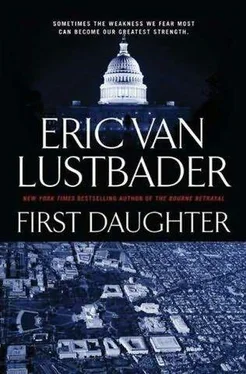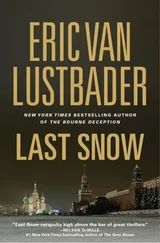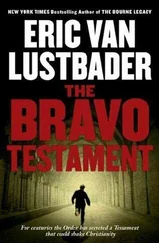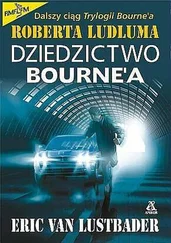This is a dream, she thought. Any minute I'll wake up in my bed at Langley Fields. If this were real, my bodyguards would have rescued me by now. My father would be here, along with a battalion of Secret Service agents.
Then a mouse ran across her field of vision-a real, live mouse-and she shrieked.
BLACK HOODIES up over coffee-colored heads, the two young black men overran the block of T Street SE between Sixteenth Street SE and Seventeenth Street SE, the way dogs mark their territory. The Anacostia section of the District was not a good place to be if you weren't black, and even then if you were like these two big, rangy twenty-year-olds, you'd best be on the lookout for Colombians who, sure as hell if they caught you, would accost you, take all your cash, then, like as not, break your ass.
These two were searching for Salvadorans, runty little critters whom they could handle, on whom they could take out their rage, take their cash, then, like as not, break their asses. For years now, the Colombians, who owned the drug trade, had been muscling into the heavily black areas like Anacostia. Skirmishes had turned into battles, front lines fluid day to day. There had yet to be a full-blown turf war, though that level of hostility was in the air, corrosive as acid raid. In the Colombians' wake, slipstreaming like second-tier bicycle racers, came the Salvadorans, nipping at their heels, trying to dip their beaks. That's the way things worked in Anacostia; that was the pecking order, written in broken bones and blood.
In any event, it was broken bones and blood these two were out for, so when they saw the big old red Chevy drawn to a stop at the traffic light at Oates, fenders sanded down to a dull desert hue, they sprinted in a pincer move, rehearsed and deployed scores of times. These two knew the timing of the lights in Anacostia as if they had installed them themselves; they knew how many seconds they had, what they had to do. They were like calf-ropers let loose in a rodeo, the clock ticking down from 120, and they'd better have made their move before then if they expected to get the prize. Further, they knew every car native to the hood-especially those owned by the Colombians, bombing machines with high-revving engines, ginormous shocks, astounding custom colors that made your eyes throb, your head want to explode. The sanded-down Chevy was unknown to them, so fair game. Inside, a young black male, making that mistake that outsiders made now and again, stopping in Anacostia instead of bombing on through like a bat out of hell, red traffic lights be damned. There wasn't a cop within three miles to stop him.
The truth of it was, he shouldn't have been here at all, so he deserved everything that came to him, which included being hauled out of his car, thrown to the tarmac, derided, pistol-whipped, and kicked until his ribs cracked. Then, tamed and docile, his pockets were ransacked, his cellie, watch, ring, necklace, the whole nine yards disappearing into deep polyester pockets. Took his keys, too, just to teach him a lesson, to be deftly whipped underhand into the yawning slot of a storm drain, there to click-clack-click derisively. The two thugs then fled, howling and whooping raggedly into a night with its head pulled in tighter than a turtle's.
RONNIE KRAY, drawn out of a back room by epithets and racial slurs hurled like Molotov cocktails, watched from behind a thickly curtained window as the two punks leapt down the street, whooping, guns raised, the flags of their gang, high on blood-lust. He knew those two, even knew where they had procured those guns, just as he knew every shadowy creepy-crawly of this marginalized neighborhood where civility had been mugged, civilization had fallen asleep and never woken up. He knew the lives they led, the lives they couldn't escape. He used that knowledge when he had to. Those guns, for instance, were as old and decrepit as the building stoops, no self-respecting District cop would be caught out on the street with one. But those guns-cheap, disposable, out of control-were all the young men had; in the way young white men in Georgetown had their parents to protect them, these thugs had their guns. And like parents, rich or poor, the weapons would probably fail you when you most needed them.
Ronnie Kray was curdled by these thoughts as he surveyed the graffitied row house fronts, the cyclone fences hemming in patches of dirt and half-dead grass across the empty potholed street. Fear had cleared the area as efficiently as a canister of tear gas. From the fumy gutter a sheet of newspaper lifted into the air, as if being read by one of the many mournful ghosts washed up on the shore of this wasteland. At length, his gaze settled on the one other moving thing in his field of view: the pulped young black man crawling along the gutter, this low thoroughfare the only one open to him. Even so, he quickly exhausted himself, spread-eagled like a starfish in spillage, much of it his own.
Ronnie Kray watched, observant as a hawk overflying a field of rabbit warrens. He could have gone out to help the young man, but he didn't. He could have called 911, but he didn't. In truth, those ideas never crossed his mind. Kray was a missionary, and like all good missionaries, his mind ran along one track. Missionary zeal precluded any deviation whatsoever from his chosen path. So he stood behind the curtain, watching the world at its lowest, meanest ebb, and took heart, for only at the darkest depths, only when all hope is lost, does the catalyst for change raise a spark that turns into the flare of a thousand suns.
The moment was at hand; he knew it as surely as his heart beat or his lungs took in air. At last, when all movement had ceased, he turned and padded silently away, through a front parlor wrapped in the dust of ages. Everywhere lay teetering stacks of old books, abandoned magazines, forgotten vinyl phonograph records in colorful cardboard jackets. They weren't his, so he didn't feel the compulsion to categorize, alphabetize, catalog them, or even to align their edges so they wouldn't make his teeth grind every time he saw them.
On the paneled hallway walls were hung black-and-white photographs of a girl, not more than twenty, with intelligent, wide-apart eyes. The flattened, slightly grainy images of her face were the result of an extended telephoto lens like those used in police and DEA surveillance. In all the photos, the backgrounds were smeared and blurry. But in one or two could be made out a piece of the flag of the United States.
The kitchen was a cheery shade of yellow. It had wooden cupboards, painted a glossy white. Gaily striped cafe curtains were drawn across the windows. He paused at the soapstone sink, slowly drained a tumbler of cold water, then, after washing the glass with soap and steaming hot water he set it upside down in the precise center of the drainboard. He opened the refrigerator. Inside, all the metal racks had been removed to make room for the girl he'd curled into it, her knees kissing her chin. Her eyes were filmed, her blue-white skin a crush of crepe paper. Her arms were placed on her thighs. Her left hand was missing. Reaching into the triangular space between her heels and her buttocks, he removed a small cloth sack.
Off the kitchen was a small room. Once a pantry, the windowless room was outfitted with a small stainless steel sink, a cupboard straight out of a Grimm fairy tale, a beaten-up chest of drawers salvaged from the street and rehabbed with an exacting attention to detail. At the chest, he opened drawers that were filled neatly with chemical reagents, gleaming scalpels, retractors, sterile syringes, vials of sera all in perfectly neat rows set within mathematically placed metal dividers. He took out a pair of surgical pliers, put it in the right-hand pocket of his overalls.
Reaching up, he opened the cupboard. Pseudocerastes persicus coiled around the semidarkness, neat as a sailor's rope. The light spun off scales the pale pink of human flesh pulled inside out. The Persian horned viper raised her head, body uncoiling slowly. The supraorbital horns made her appear as sinister as a demon. Just below the horns, the ruby eyes opened and the forked tongue flickered out. Then, catching sight of the cloth sack, her jaws hinged wide, revealing erected fangs, hollow with venom.
Читать дальше












